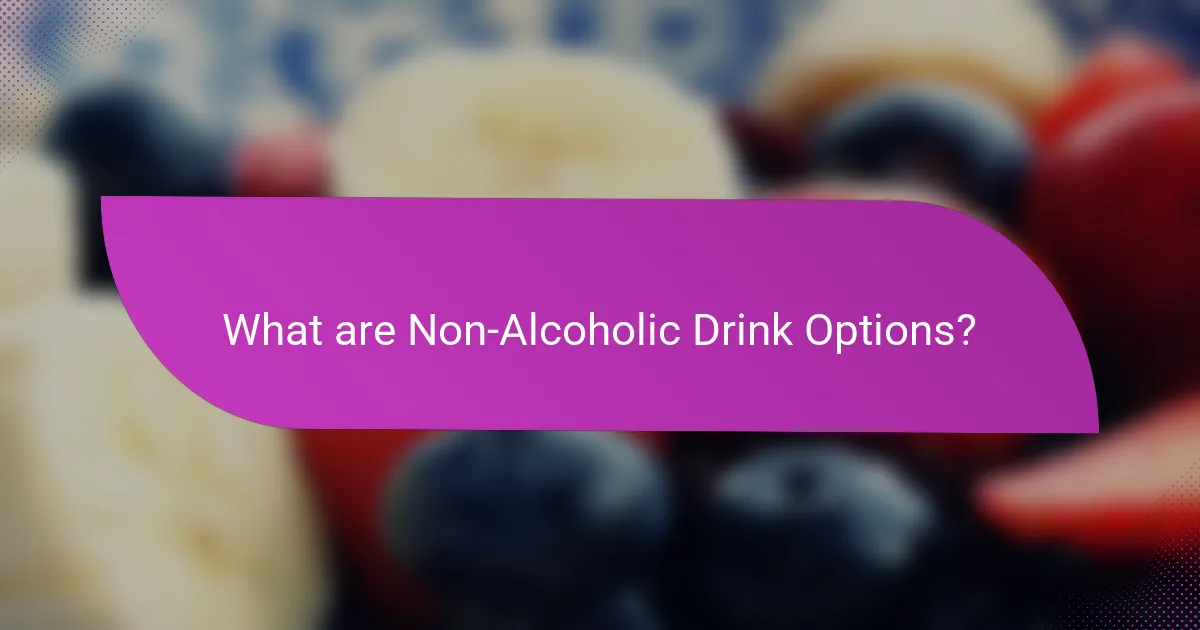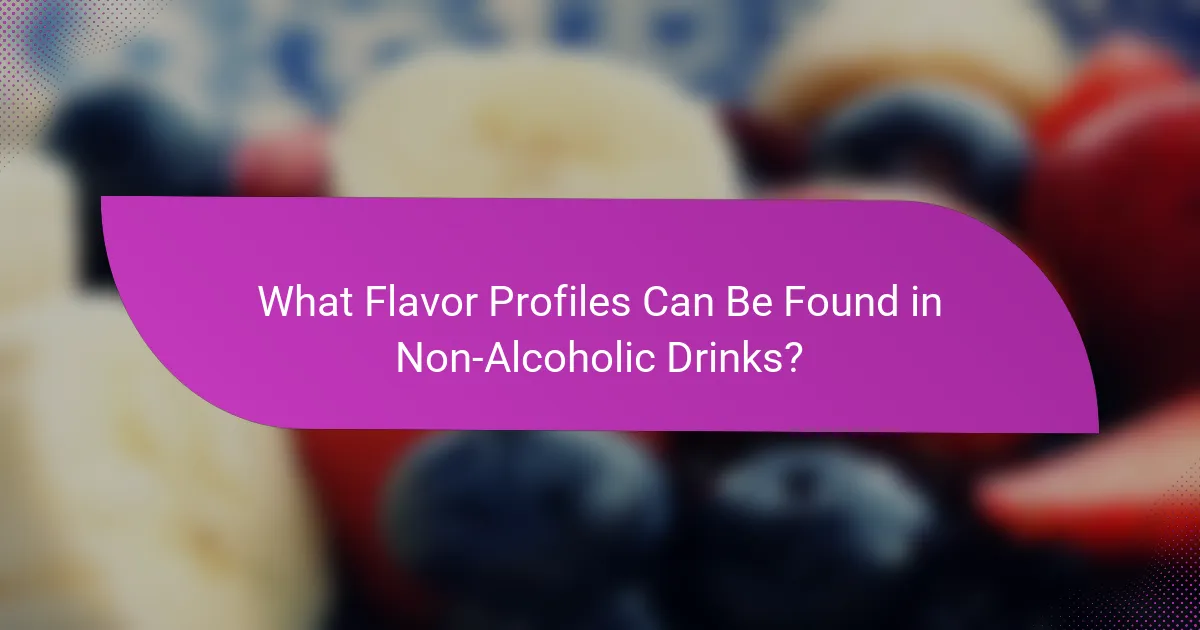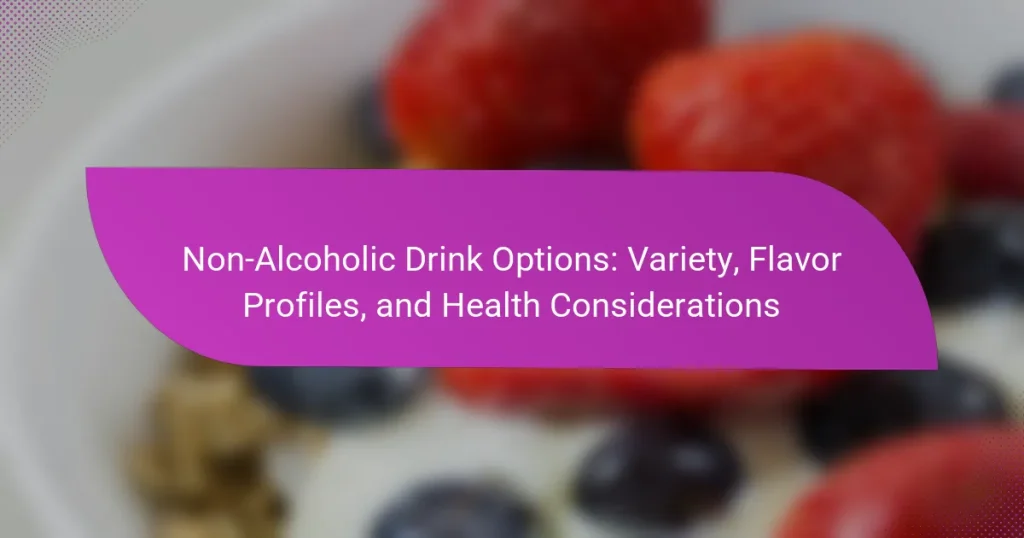Non-alcoholic drink options include a wide variety of beverages that do not contain alcohol, such as juices, sodas, teas, and flavored waters. Popular choices in this category encompass sparkling water, herbal teas, and fruit juices, along with non-alcoholic beers and wines. The article explores the diverse flavor profiles of non-alcoholic drinks, including fruity, herbal, spicy, and creamy options, catering to various taste preferences and occasions. Additionally, it addresses health considerations related to calorie content, sugar levels, and artificial additives, emphasizing the importance of informed choices for hydration and wellness. The growing global market for non-alcoholic beverages reflects an increasing demand for healthier alternatives.

What are Non-Alcoholic Drink Options?
Non-alcoholic drink options include beverages that do not contain alcohol. These options encompass a wide variety of drinks such as juices, sodas, teas, and flavored waters. Popular choices include sparkling water, herbal teas, and fruit juices. Many non-alcoholic beers and wines are also available. These drinks cater to various taste preferences and occasions. They provide alternatives for social settings where alcohol consumption is not desired. Health-conscious consumers often choose non-alcoholic options for hydration and wellness. The global market for non-alcoholic beverages is growing, reflecting increased demand for healthier choices.
Why are Non-Alcoholic Drinks Gaining Popularity?
Non-alcoholic drinks are gaining popularity due to a growing health consciousness among consumers. Many individuals are seeking healthier lifestyle choices. This trend includes reducing alcohol consumption. Research indicates that 66% of adults are trying to limit their alcohol intake. Additionally, non-alcoholic drinks offer diverse flavor profiles. Brands are innovating to create complex and enjoyable beverages. Social occasions also contribute to this trend. People desire inclusive options that allow participation without alcohol. The rise of wellness culture further supports this shift. Overall, non-alcoholic drinks meet the demand for healthier, flavorful alternatives in social settings.
What demographic trends are influencing the rise of non-alcoholic drinks?
Younger generations are increasingly driving the rise of non-alcoholic drinks. Millennials and Gen Z prioritize health and wellness, leading to a shift away from alcohol consumption. These demographics seek healthier lifestyle choices and are more open to exploring diverse beverage options. Studies indicate that 66% of millennials are reducing their alcohol intake. Additionally, the trend of mindful drinking emphasizes moderation, appealing to consumers who want to enjoy social occasions without alcohol. The increasing availability of innovative non-alcoholic options also attracts younger consumers. As a result, non-alcoholic drinks are gaining popularity across various social settings.
How do cultural shifts contribute to the popularity of non-alcoholic options?
Cultural shifts significantly enhance the popularity of non-alcoholic options. Increased health awareness drives consumers to seek alternatives to alcohol. Many individuals now prioritize wellness and fitness, influencing their beverage choices. Social gatherings increasingly feature non-alcoholic drinks, promoting inclusivity. The rise of mindfulness and self-care trends encourages moderation in drinking habits. Additionally, younger generations are more open to non-alcoholic beverages, reflecting changing social norms. Market research indicates a growing demand for diverse non-alcoholic options, with sales increasing by over 30% in recent years. These factors collectively contribute to the rising popularity of non-alcoholic options.
What Types of Non-Alcoholic Drinks are Available?
Non-alcoholic drinks include a wide variety of options. Common types are soft drinks, juices, teas, and flavored waters. Soft drinks often contain carbonation and sugar or artificial sweeteners. Juices can be made from fruits or vegetables and are often rich in vitamins. Teas, both herbal and traditional, provide various flavors and potential health benefits. Flavored waters offer hydration with added taste and minimal calories. Additionally, non-alcoholic beers and wines mimic their alcoholic counterparts without the intoxicating effects. These drinks cater to diverse preferences and dietary needs.
What are the main categories of non-alcoholic beverages?
The main categories of non-alcoholic beverages include soft drinks, juices, teas, coffees, and bottled water. Soft drinks are carbonated beverages that often contain sugar or artificial sweeteners. Juices are typically made from the extraction of fruits or vegetables. Teas are brewed from the leaves of the Camellia sinensis plant or herbal ingredients. Coffees are made from roasted coffee beans and can be served hot or cold. Bottled water refers to purified or spring water packaged for consumption. These categories encompass a wide range of flavors and options for consumers.
How do different types of non-alcoholic drinks compare in terms of flavor and ingredients?
Non-alcoholic drinks vary significantly in flavor and ingredients. Soft drinks typically contain carbonated water, sweeteners, and flavorings, resulting in a sweet and fizzy profile. Juices, made from fruits or vegetables, emphasize natural sweetness and acidity, offering a refreshing taste. Herbal teas, brewed from various plants, provide earthy or floral flavors, often without added sugars. Coffee substitutes, such as roasted grain beverages, mimic coffee’s bitterness but lack caffeine. Flavored waters combine water with natural flavors, offering a subtle taste without calories. Each type of non-alcoholic drink uses distinct ingredients that contribute to its unique flavor profile. This diversity allows consumers to choose based on personal preference and dietary needs.
What are the Key Benefits of Choosing Non-Alcoholic Drinks?
Non-alcoholic drinks offer several key benefits. They promote better health by reducing the risk of alcohol-related diseases. Consuming non-alcoholic beverages can improve hydration levels. They typically contain fewer calories than their alcoholic counterparts. Non-alcoholic drinks can enhance social interactions without the effects of intoxication. They provide a wide range of flavors and options for diverse tastes. Studies show that non-alcoholic options can help individuals maintain a balanced lifestyle. Additionally, they are safe for all age groups, making them accessible to everyone.
How do non-alcoholic drinks support a healthier lifestyle?
Non-alcoholic drinks support a healthier lifestyle by providing hydration without the negative effects of alcohol. They often contain fewer calories than alcoholic beverages. Many non-alcoholic options are rich in vitamins and minerals. For example, fruit juices and herbal teas can offer essential nutrients. They also help in maintaining better mental clarity and focus. Research indicates that reducing alcohol consumption can lower the risk of chronic diseases. A study published in the journal “Alcoholism: Clinical and Experimental Research” found that non-alcoholic alternatives can improve overall health outcomes. This makes non-alcoholic drinks a beneficial choice for those seeking a healthier lifestyle.
What are the social benefits of opting for non-alcoholic beverages?
Opting for non-alcoholic beverages fosters inclusivity in social settings. These beverages allow individuals who do not consume alcohol to participate fully in gatherings. Non-alcoholic options can enhance social interactions without the effects of intoxication. They promote healthier lifestyle choices, encouraging conversations about wellness. Studies show that socializing without alcohol can lead to stronger, more meaningful connections. Additionally, non-alcoholic beverages can appeal to a broader audience, including designated drivers and those in recovery. This inclusivity can create a more welcoming environment for all attendees.

What Flavor Profiles Can Be Found in Non-Alcoholic Drinks?
Non-alcoholic drinks offer a diverse range of flavor profiles. Common profiles include fruity, herbal, spicy, and creamy. Fruity flavors often come from ingredients like citrus, berries, or tropical fruits. Herbal profiles may feature ingredients such as mint, basil, or chamomile. Spicy flavors can be derived from ingredients like ginger or cinnamon. Creamy profiles are usually created using dairy or plant-based milks. Additionally, non-alcoholic drinks may have savory notes, often from ingredients like tomato or vegetable juices. These flavor profiles cater to various preferences and occasions, making non-alcoholic options versatile and appealing.
How do Flavor Profiles Vary Among Non-Alcoholic Options?
Flavor profiles among non-alcoholic options vary significantly based on ingredients and preparation methods. Non-alcoholic beverages can range from fruity and sweet to herbal and spicy. For example, fruit juices typically offer bright, sweet, and tangy flavors. Herbal teas, on the other hand, provide earthy and aromatic notes.
Sodas are often characterized by their sweetness and carbonation, while flavored waters tend to have subtle hints of fruit or herbs. Additionally, non-alcoholic beers replicate malt and hop flavors, creating a unique profile distinct from traditional soft drinks.
The diversity in flavor profiles is influenced by the choice of fruits, herbs, spices, and sweeteners used in the beverages. This variety caters to different taste preferences and dietary needs, making non-alcoholic options versatile for consumers.
What are the common flavor categories in non-alcoholic drinks?
Common flavor categories in non-alcoholic drinks include fruity, herbal, spicy, and creamy. Fruity flavors often feature citrus, berry, and tropical notes. Herbal flavors can include mint, chamomile, or basil. Spicy flavors may feature ginger, cinnamon, or cardamom. Creamy flavors often involve dairy or plant-based alternatives like almond or coconut. These categories provide a diverse range of options for consumers.
How do flavor profiles differ between various types of non-alcoholic beverages?
Flavor profiles differ significantly among various types of non-alcoholic beverages. Soft drinks typically have sweet, carbonated flavors due to added sugars and acids. Juices often present fruity and natural sweetness, with varying acidity levels depending on the fruit. Herbal teas offer earthy and aromatic flavors, influenced by the specific herbs used. Iced teas may range from sweet to bitter, depending on the brewing process and added ingredients. Sports drinks are designed to be slightly salty and sweet to replenish electrolytes. Each beverage type has a unique combination of sweetness, acidity, and other flavor notes that define its profile.
What Ingredients Contribute to Flavor in Non-Alcoholic Drinks?
Flavor in non-alcoholic drinks is contributed by various ingredients. Key ingredients include fruits, herbs, spices, and sweeteners. Fruits like citrus, berries, and tropical options provide natural sweetness and acidity. Herbs such as mint, basil, and rosemary add freshness and complexity. Spices like cinnamon, ginger, and cardamom introduce warmth and depth. Sweeteners, including sugar, honey, and agave, enhance overall flavor. Additionally, acids like lemon juice or vinegar can balance sweetness and elevate taste. Flavor extracts, such as vanilla or almond, also contribute unique notes. Each ingredient plays a distinct role in creating a harmonious flavor profile in non-alcoholic beverages.
What role do natural ingredients play in flavor development?
Natural ingredients are essential in flavor development for beverages. They provide authentic taste profiles that enhance overall sensory experience. Ingredients like herbs, fruits, and spices contribute distinct flavors. For example, citrus fruits add brightness, while herbs can introduce complexity. The use of natural ingredients often results in healthier options. They contain fewer artificial additives and preservatives. Research indicates that consumers prefer drinks made with real ingredients. A study by Mintel found that 64% of consumers seek natural ingredients in beverages. This trend underscores the importance of natural components in flavor development.
How do artificial flavors impact the taste of non-alcoholic beverages?
Artificial flavors significantly influence the taste of non-alcoholic beverages. They enhance sweetness and create complex flavor profiles. These flavors mimic natural tastes, providing consistency across products. For example, a beverage with artificial strawberry flavor can taste similar regardless of the brand. Studies show that consumers often prefer artificial flavors for their intensity. This preference can lead to increased sales for products using these flavors. However, some consumers may perceive artificial flavors as less authentic compared to natural options. Overall, artificial flavors play a crucial role in shaping the sensory experience of non-alcoholic drinks.

What Health Considerations Should Be Made with Non-Alcoholic Drinks?
Health considerations for non-alcoholic drinks include calorie content, sugar levels, and artificial additives. Many non-alcoholic beverages can be high in calories, especially those that are sweetened. For instance, some flavored sodas contain around 150 calories per serving. Additionally, excessive sugar consumption can lead to health issues such as obesity and diabetes. Some non-alcoholic drinks may also contain artificial sweeteners, which have been linked to potential health risks. It’s essential to check labels for ingredients and nutritional information to make informed choices. Hydration is another key consideration, as some drinks may not effectively hydrate the body. Opting for options like water, herbal teas, or low-calorie beverages can support better health outcomes.
What Nutritional Benefits Do Non-Alcoholic Drinks Offer?
Non-alcoholic drinks offer various nutritional benefits. They often contain vitamins and minerals that contribute to overall health. For example, fruit juices provide vitamin C, which supports the immune system. Herbal teas can be rich in antioxidants, promoting cellular health. Non-alcoholic beverages can also be lower in calories than alcoholic options, aiding in weight management. Many non-alcoholic drinks are hydrating, which is essential for bodily functions. Some options include added electrolytes, beneficial for hydration and recovery. Additionally, non-alcoholic drinks can be a source of probiotics, supporting gut health. Overall, these beverages can enhance nutritional intake while providing enjoyable flavors.
How do non-alcoholic drinks compare to alcoholic options in terms of calories?
Non-alcoholic drinks generally contain fewer calories than alcoholic options. For example, a standard beer can have around 150 calories, while light beers may have about 100 calories. In contrast, many non-alcoholic beverages, like sparkling water or diet sodas, can have zero to 10 calories. Cocktails often exceed 200 calories due to added sugars and mixers. Thus, non-alcoholic drinks can be a lower-calorie choice for those monitoring their intake.
What vitamins and minerals can be found in popular non-alcoholic beverages?
Popular non-alcoholic beverages contain various vitamins and minerals. For example, orange juice is rich in vitamin C and potassium. Coconut water provides electrolytes, including potassium and magnesium. Many smoothies include fruits and vegetables, offering vitamins A, C, and K, along with folate. Fortified plant-based milks often contain calcium, vitamin D, and vitamin B12. Herbal teas can provide antioxidants and small amounts of minerals like manganese. Additionally, certain sodas are fortified with vitamins, such as B vitamins. These beverages contribute essential nutrients to the diet.
Are There Any Health Risks Associated with Non-Alcoholic Drinks?
Yes, there are potential health risks associated with non-alcoholic drinks. Some non-alcoholic beverages contain high levels of sugar. Excessive sugar intake can lead to obesity and diabetes. Additionally, many non-alcoholic drinks use artificial sweeteners. These sweeteners may have adverse effects on gut health. Some non-alcoholic beers contain gluten, which can be problematic for individuals with celiac disease. Certain drinks may also have high caffeine content, leading to anxiety or sleep disturbances. It is essential to read labels and be aware of these factors.
What should consumers be aware of regarding added sugars in non-alcoholic drinks?
Consumers should be aware that many non-alcoholic drinks contain high levels of added sugars. These sugars contribute to excessive calorie intake. According to the American Heart Association, women should limit added sugars to 6 teaspoons per day, while men should limit to 9 teaspoons. Consuming too much added sugar can lead to health issues such as obesity and type 2 diabetes. Labels on drinks often do not clearly indicate sugar content. Some beverages can contain more than 40 grams of sugar per serving. Consumers should check ingredient lists and nutrition facts to make informed choices. Awareness of these factors can help individuals maintain a healthier diet.
How do certain ingredients in non-alcoholic drinks affect health?
Certain ingredients in non-alcoholic drinks can significantly affect health. For example, high sugar content can lead to weight gain and increased risk of diabetes. Artificial sweeteners may disrupt gut health and trigger cravings for more sugar. Caffeine, found in many sodas and energy drinks, can cause insomnia and increased heart rate. Natural ingredients like ginger and turmeric can provide anti-inflammatory benefits. Additionally, vitamin-enriched drinks can support immune function and overall wellness. The impact of these ingredients varies based on individual health conditions and consumption levels.
What Tips Can Help You Choose the Best Non-Alcoholic Drinks?
To choose the best non-alcoholic drinks, consider flavor, ingredients, and purpose. First, identify your flavor preferences, such as sweet, sour, or herbal. Next, review the ingredient list for natural components and avoid artificial additives. Look for drinks that offer health benefits, like low sugar or added vitamins. Additionally, consider the occasion; some drinks are better suited for social gatherings while others are ideal for casual consumption. Research brands and reviews to find popular options. Finally, sample different drinks to discover what you enjoy most.
Non-alcoholic drink options encompass a diverse range of beverages, including juices, sodas, teas, and flavored waters, catering to various taste preferences and occasions. The article explores the increasing popularity of these drinks driven by health consciousness, demographic trends, and cultural shifts that prioritize wellness and inclusivity in social settings. It discusses the types of non-alcoholic drinks available, their flavor profiles, health benefits, and nutritional considerations, while also addressing potential health risks associated with high sugar content and artificial additives. Key tips for selecting the best non-alcoholic beverages are provided, emphasizing the importance of ingredients and personal preferences.




